|
|
|
Sort Order |
|
|
|
Items / Page
|
|
|
|
|
|
|
| Srl | Item |
| 1 |
ID:
173160
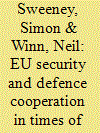

|
|
|
|
|
| Summary/Abstract |
Has the United Kingdom(UK) Brexit referendum been a catalyst for more European Union security cooperation? How significant are post-referendum initiatives in security and defence? What are the implications of Brexit for European Union (EU) and UK security and defence? This article analyses EU post-Brexit strategic choices following the launch of the EU Global Strategy (2016). EU autonomy in security and defence requires close cooperation with third countries, including Norway and post-Brexit UK. It remains to be seen whether the EU and the UK can forge a new bespoke security and defence relationship that delivers mutual benefits through shared strategic ambitions, while also protecting their various interests. We suggest there will be serious collateral damage to UK-EU security and defence cooperation if post-Brexit trade negotiations descend into acrimony and mistrust, especially in the event of “no-deal” once the “transition period” ends. This would undermine European security and the EU’s quest for strategic autonomy in world affairs and have serious implications for both UK and EU security. We conclude that the EU needs to work with the UK on a plan to achieve global strategic autonomy, or both risk reduced influence in the wider world in the years ahead.
|
|
|
|
|
|
|
|
|
|
|
|
|
|
|
|
| 2 |
ID:
154480
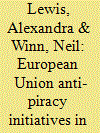

|
|
|
|
|
| Summary/Abstract |
Piracy off the coast of Somalia has resulted in a steady decline in trade through the Arabian Sea and higher costs of doing business for multiple world regions. The EU has responded to the threat with a large-scale anti-piracy operation in the Horn of Africa, which constitutes the first free-standing Common Security and Defence Policy (CSDP) military operation that is not entirely dependent on North Atlantic Treaty Organization (NATO) planning and assets. The operation is designed to interdict Somali piracy operations across the Gulf of Aden and to keep some of the world’s busiest sea lanes open for reasons of world trade. This article argues that the EU preoccupation with military solutions to the piracy problem, based on interventions through the Somali federal government with an emphasis on security, is insufficient because it fails to address the underlying causes of piracy and misunderstands the Somali socio-cultural-security nexus and the need for practical longer term land-based approaches to development. The reduction of Somali piracy activities can be linked to this increased military response capacity as well as to increased security precautions undertaken by shipping companies, but none of these strategies has succeeded in dismantling piracy networks. They therefore offer only a temporary and costly stopgap measure.
|
|
|
|
|
|
|
|
|
|
|
|
|
|
|
|
| 3 |
ID:
056956
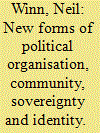

|
|
|
| 4 |
ID:
191450
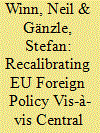

|
|
|
|
|
| Summary/Abstract |
With China and Russia acting more assertively vis-à-vis Central Asia, Kazakhstan, Kyrgyzstan, Tajikistan, Turkmenistan, and Uzbekistan have gradually moved to the core of contemporary Eurasian geopolitics – albeit to varying degrees. The European Union (EU) has purposefully sought to promote its norms and values in the region for quite some time in the past. However, considering the ongoing Western “polycrisis” exacerbated by the Covid-19 pandemic most recently, our paper investigates how the EU has been recalibrating its relationship towards Central Asia – within the timespan of its two EU Central Asia Strategies, dating from 2007 and 2019, respectively. We argue that the reformulation of EU policy towards Central Asia is pragmatically taking its lead from the growing constraints of EU foreign policy as well as Chinese and Russian intervention in the region; it is, in the end, geographical proximity that continues to shape geopolitics in Central Asia.
|
|
|
|
|
|
|
|
|
|
|
|
|
|
|
|
| 5 |
ID:
185345
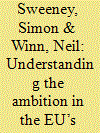

|
|
|
|
|
| Summary/Abstract |
The quest for substance, capability, and strategic autonomy goes on – or does it? Is the objective of CSDP territorial defence and strategic autonomy, or crisis management and softer security concerns like peacekeeping, border management, protection of shipping lanes, and/or cyber security? The Union needs to move beyond familiar complaints about the lack of common strategic culture and EU intrusion into NATO responsibilities. Geostrategic and economic imperatives dictate that the EU should progress CSDP beyond civilian crisis management in the EU Neighbourhood, and military training and security sector reform (SSR). The Strategic Compass must signal CSDP clarity of objectives, coherence, enhanced capability, and appropriate burden sharing with NATO. The response to the Strategic Compass must build European strategic autonomy in ways that strengthen NATO. For military strategic and economic reasons, both the EU and the post-Brexit UK need intensive cooperation to maintain their geostrategic relevance and strengthen the NATO alliance. This paper reflects on prospects for the EU Strategic Compass and offers timely analysis of recent trends in EU foreign and security policy and expresses cautious optimism regarding the enhanced European strategic autonomy/actorness.
|
|
|
|
|
|
|
|
|
|
|
|
|
|
|
|
|
|
|
|
|